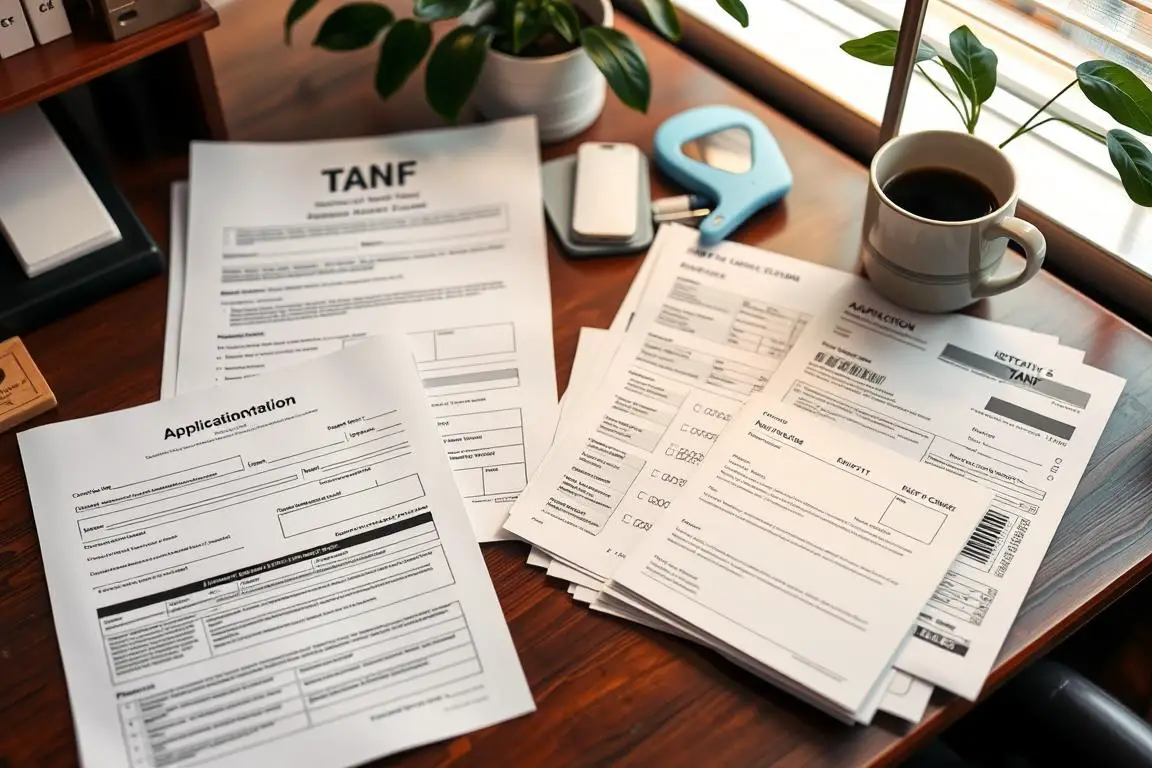Everything You Should Know Before Submitting Your TANF Application

Imagine a safety net ready to catch families from falling. This net is the Temporary Assistance for Needy Families (TANF) program. It’s a hope for those facing tough times, offering up to $16.5 billion a year in aid1. TANF is a key part of government help, providing low-income folks with financial and social services support.
Filling out a TANF application can feel like walking through a maze. Yet, with the right knowledge, you’ll find your way to benefits. First, understand the eligibility rules. Your home must include at least one minor, and your income should be low—no more than half the area’s median1. If you’re earning little to very little, living in your state, and have a child under 18, TANF could be your guide to smoother sailing.
Before you apply, gather the required documents. You’ll need proof of who you are, where you live, and what you earn1. Though TANF has its rewards, receiving them demands efforts. Adults must work or engage in activities like job training1. Also, keep an eye on your assets. Items like cars and stocks must be within limits to qualify for TANF1.
Key Takeaways
- Understanding TANF eligibility is imperative; your household must include a child under 18 and meet income and asset criteria1.
- Prepare essential documents carefully; verified personal, financial, and residency information are vital to the application process1.
- Employment or participation in work activities is a cornerstone requirement for adults receiving TANF benefits1.
- Each state’s TANF application process may vary, so verify whether you can apply online, in-person, or by other means available in your area1.
- TANF supports a range of services, beyond direct financial aid, such as job training and child care assistance, to bolster your ascent to self-sufficiency1.
Understanding TANF: Eligibility and Application Process
The Temporary Assistance for Needy Families (TANF) program helps families in need. It is part of welfare programs and government aids. Knowing your eligibility, what documents you need, and how to apply is key.
Are You Eligible for TANF?
To get TANF benefits, your household must meet certain criteria. This includes having a child under 19 or a pregnant woman. You must also live in the state where you are applying. Your monthly income must be below $2,941 for three people2. People with some felony convictions or who have maxed out TANF benefits can’t get help.
Essential Documents for TANF Application
Gathering the right documents is critical in the TANF application process. You will need IDs, birth certificates for kids, income proof, and social security numbers. These papers prove your situation. They are very important for getting government help.
Steps to Submit Your TANF Application Effectively
For TANF aid, start with a pre-screening. Collect all needed documents. Then submit your application online or at a local office. Make sure you handle this process well to get all your paperwork right.
The Interview: What to Expect
You will talk about your rights and needs in the TANF interview. This step is vital. It finds out what help you can get. You will know if you are approved or not within thirty days3.
Knowing how TANF works can really help. It guides you through the process. This helps families get the most from government aid programs.
Maximizing Your Chances: Tips and Guidance for TANF Applicants
Applying for Temporary Assistance for Needy Families (TANF) is vital if you’re facing financial challenges. Knowing how to properly apply and meeting the needed criteria is key to a successful application.
To be eligible for TANF, your income and family size matter a lot. You need to make less than 100-300% of the federal poverty level. Also, your assets should not be more than $1,000-$4,000 as stated in the guidelines4. You need to include all household income like child support and Social Security4. Knowing these details can really help you get TANF money, which could be between $200 and $800 a month depending on where you live4.
After checking if you’re eligible, being proactive in the application process is very important. You must:
- Take part in job training or look for work, as your state requires4.
- Meet working hours set for both single and married people getting help4.
- Look into special cases if someone in your family has a disability because you might not have to meet work rules4.
Connecting with other welfare assistance programs and efforts to lower dependency is key. It’s important to get involved with government aid programs that help with child care, transportation, and jobs. These are important for stability and to avoid needing TANF again5.
When applying, filling out all the paperwork correctly and getting ready for your interview are crucial steps. Also, think about how you might get support even after the usual 60-month limit, providing extra help when times are tough4.
| Aspect | Impact on Application | Recommended Action |
|---|---|---|
| Documentation | Essential for proving eligibility | Ensure all required documents are current and accurately filled |
| Job Training | Increases employability | Engage in state-recommended or available training programs |
| Income Reporting | Critical for benefit calculation | Report all income sources as directed by TANF4 |
| Special Conditions | Can influence eligibility and benefits | Learn about waivers and extra support for families with disabled members4 |
Knowing what TANF needs and asking for help from assistance for low-income individuals will really improve how you deal with TANF. By following these tips and preparing well, you’re working towards not only getting help now but also building a better future.
Government Assistance Programs: Navigating Public Benefits and Community Resources
Living in a world where financial certainty isn’t guaranteed, it’s important to know about government aid. The Temporary Assistance for Needy Families (TANF) is key for those facing hard times. Alongside other support, TANF provides food, housing, and job training, which are essential when in need.
How TANF Fits Within Broader Welfare Assistance Programs
TANF stands as a vital component of public benefits, focusing on improving low-income families’ lives. It offers access to necessary resources and promotes independence. Together with other initiatives, TANF aims not only for immediate relief but also for long-lasting security6.
Financial Aid Programs Beyond TANF
Beyond TANF, there are many financial aids for different situations. For instance, unemployment insurance helps out-of-work individuals6. The Housing Choice Voucher (HCV) program makes sure low-income families can find affordable places to live6. Also, FAFSA-linked aids support students’ dreams of overcoming economic challenges through education6.
Additional Community Outreach Programs and Support Services
There are also many community outreach and support services. These are designed to meet both immediate and long-term needs of those struggling. They offer emergency aid for disaster victims and help homeless people find stability. This shows the wide-reaching efforts to lessen difficulties and encourage community well-being7.
| Program | Description | Impact |
|---|---|---|
| SSI (Supplemental Security Income) | A federal program helping older, blind, or disabled individuals with limited income | Provides monthly payments for basic needs and potential Medicaid and food stamps eligibility6 |
| SNAP (Supplemental Nutrition Assistance Program) | Offers nutrition benefits to supplement the food budget of needy families | Enables low-income families to buy nutritious food with Electronic Benefits Transfer (EBT) cards7 |
| Medicaid | Health coverage to low-income individuals and families | Ensures access to necessary medical services for sustainable health7 |
When looking into government grants and subsidies, being well-informed is key. Whether you need help with a temporary issue or support for your education, these programs are here to help. Make sure to connect with local services and community programs to fully benefit from these opportunities designed for you.
Conclusion
As we close our look at the TANF application process, it’s clear that being fully aware and prepared is key. By tapping into government, welfare, and financial aid, you’re not just after immediate help. You’re building a foundation for a stable future. TANF works together with other support networks, proven by the high 78.8% approval rate for those earning less, thanks to financial help from hospitals8. Also, hospitals provided $26 billion in charity care in 2018, helping both uninsured and insured patients8.
Take North Carolina’s HOPE Program as an example, with $744 million helping over 148,939 homes, showing the power of well-run aid efforts9. These programs save lives and highlight the smart use of funds–a must for government aid9. It’s vital to stay engaged with caseworkers and meet program demands to make the most of these key benefits. These, like hospital financial help, can improve health service use and detect health issues early8.
The path through TANF might be tough but rewarding. You’re not alone, seen by the success of the HOPE Program, ranked third nationwide for helping most households and sixth in using federal Emergency Rental Assistance (ERA) money9. Tackle this path with hard work and creativity. Remember, the help available is meant to lead to independence and well-being. In the end, knowing and using these aids is crucial for lasting financial and health security.
FAQ
Are You Eligible for TANF?
What Documents Do You Need When Submitting Your TANF Application?
What Are the Steps to Submit Your TANF Application Effectively?
What Should You Expect During the TANF Interview?
How Does TANF Fit Within Broader Welfare Assistance Programs?
What Other Financial Aid Programs Are Available Besides TANF?
Can You Participate in Community Outreach Programs Alongside TANF?
What Tips Can Maximize Your Chances of Receiving TANF?
Source Links
- TANF: Temporary Assistance for Needy Families – https://benefits.com/food-stamps/tanf/
- Temporary Assistance for Needy Families (TANF) and Temporary Assistance for Other Needy Families (TAONF) – https://humanservices.hawaii.gov/bessd/tanf/
- Few Families Receive the TANF Cash Assistance They’re Eligible For – https://www.urban.org/urban-wire/few-families-receive-tanf-cash-assistance-theyre-eligible
- Temporary Assistance for Needy Families – https://www.cerebralpalsy.org/resources/government-resources/cash-assistance/tanf
- Slide 1 – https://www.ey.com/content/dam/ey-unified-site/ey-com/en-us/insights/consulting/documents/ey-how-one-state-uses-data-to-enhance-assistance-to-low-income-families.pdf
- Government Assistance Programs: What’s Available and Where to Apply – https://www.investopedia.com/government-assistance-programs-4845368
- Integration and coordination across public benefit programs: Insights from state and local government leaders in the United States – https://www.ncbi.nlm.nih.gov/pmc/articles/PMC9723913/
- The Impact of Financial Assistance Programs on Health Care Utilization: Evidence from Kaiser Permanente – https://www.ncbi.nlm.nih.gov/pmc/articles/PMC9634821/
- Application period closing Dec. 17 for HOPE rent and utility assistance program – https://www.ncdps.gov/news/press-releases/2021/12/13/application-period-closing-dec-17-hope-rent-and-utility-assistance-program








